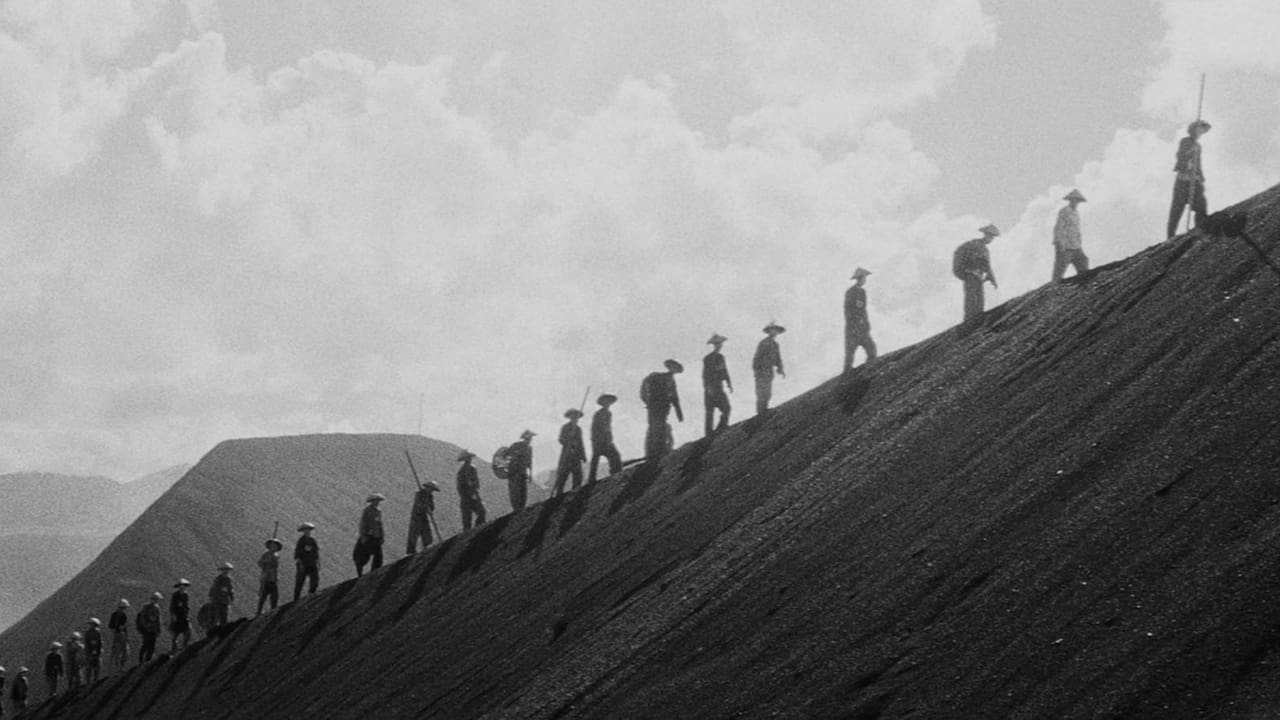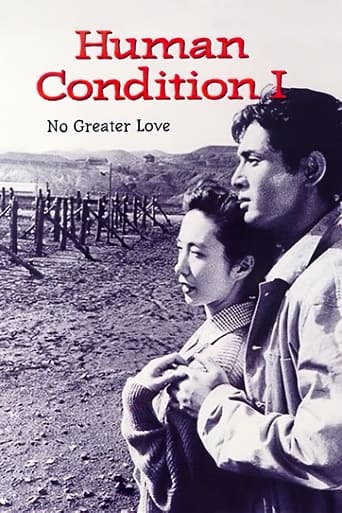



What a beautiful movie!
recommended
It's funny watching the elements come together in this complicated scam. On one hand, the set-up isn't quite as complex as it seems, but there's an easy sense of fun in every exchange.
View MoreIt's easily one of the freshest, sharpest and most enjoyable films of this year.
View MoreMasaki Kobayashi's reflection on the Japanese experience in occupying Manchuria, fighting World War II, and dealing with defeat is a staggering piece of cinema. Clocking in at just under 10 hours, "The Human Condition" – what a title! – takes us on a journey with Kaji (Tatsuya Nakadai) through a POW film, a war film and a survival film, tied together by a loose love story, weaving all these strands together with great care over its epic but impeccably paced run-time.The first part sees Kaji, a young, well-to-do Japanese, begin work as labor supervisor in a POW camp in occupied Manchuria. What could have been an interesting honeymoon with new loving wife Michiko and the start to a promising career slowly devolves into a nightmare: Kaji tries to stay true to his human principles while getting increasingly tangled in a complex web that involves escaping prisoners, abusive guards, and a tyrannical, bullish army that is above the law.As an indictment of the Japanese Imperial Army, it is all the more haunting for coming from one who served under it. And to Kobayashi's credit, never does this come across as a crass moral lecture. It is a stunning, gripping study in mounting desperation, anchored by a powerful turn from the ever-dependable Nakadai.Japanese cinema of this period has its quirks, stylish acting and a tendency to melodrama that can bemuse Western viewers. While I find Kobayashi less impaired by these traits than many of his contemporaries – especially in the cold, restrained anger and sorrow of Harakiri, his masterpiece – he gets heroic support from his star of choice. Far from the histrionics and bravado of a Toshiro Mifune, Japan's other megastar of the 50s and early 60s, Tatsuya Nakadai's magnetic charisma is far more subdued and heartfelt. Though our hero is at times unbelievably decent, perhaps buoyed by his youthful optimism and love for his wife, Nakadai makes every situation and painful decision resonate.The technical credits are the usual for this under-appreciated director's work: arresting visuals, sweeping movement, carefully crafted sets. And the supporting players leave their mark, with a stand-out in each episode. In this instance, particularly Kaji's conflicted assistant, originally mistakable for a simple brute, finds very different ways of dealing with his own crisis of conscience.This is definitely a film you have to see. Just make sure you clear your schedule, as you don't want to spread the viewing chunks too thin if watching in fragments
View MoreThis is the first of three very long movies that are based on Jumpei Gomikawa's six-volume series. It is set during WWII and is about a Japanese man named Kaji. Kaji is a very liberal man for the times--something that COULD be very dangerous in the militaristic Japanese society. When he's called up to fight in the war, he's torn. He's basically a pacifist at heart and cannot see himself killing another. Luckily for him, his boss gives him a choice--report for military duty or go off to Japanese occupied territory to be the production head for a forced labor camp. Not surprisingly, he goes to work at the camp--and takes his new wife with him.When he sees the camp, Kaji is angered--the soldiers brutalize the workers and have absolutely no regard for them. The camp is also rife with corruption. He insists that the beatings MUST stop and he is opposed by the staff--but he's not willing to budge and he has the authority to make it stick. Fortunately, when the workers are better few and treated well, production increases dramatically. However, when there are prison escapes, the hardliners press for a return to brutality. After all, they feel, these aren't exactly humans--just Chinese and Korean conscripts and, worse, Japanese political prisoners. What is Kaji to do? As the film progresses, to save himself he may need to forget about his high ideals. But, can he live with himself? And what about his marriage? Because of the job, he's withdrawn and miserable--and a lousy husband. I'd say more, but this would ruin the film.Overall, an excellent film that is worth seeing. I am excited to see what happens in the second film, as at the end of the first there is a BIG twist and Kaji's world has been turned upside down in the process. My only question is could this film STILL be a bit sanitized? From what I've read about these camps, they were MUCH more brutal than even the film portrayed.
View MoreKobayashi makes very clear his distaste for authoritarian power of any kind (I believe he has an almost exact quote to that fact), and nowhere does he see more problems than with his home country of Japan. However, what astounds me about his movies is that he is very careful to present the issues in so much more than simplistic terms, and though there are "good" guys and "bad" guys, he is a strict realist and makes sure their motivations and viewpoints are fully explained. His movies always surprise and compel me, and now that I'm one third the way through his 9 hour long trilogy, I am remembering why.Say what you want about Harakiri and Samurai Rebellion, the samurai "hero" is no action star and his fights ultimately come from being cornered where diplomacy and critical thinking no longer works. Now, Kobayashi is in the WWII era and there are no samurai defenders of justice to save the day, only a complicated mess of Imperialism, nationalism, and patriotism that one lowly humanist finds himself in constant confrontation with. Getting a job at some ore mines, Kaji hopes to find a productive job that will keep him out of the front lines of the war while doing the best to preserve human life in any way he can. At first arrival (in a noteworthily dusty and windy fashion), he confuses his new bosses and their coworkers by claiming he can increase production by--get this--treating workers well and giving them an incentive to work. These terribly radical ideas that clash so harshly against the typical production cycle of "beat the worker, get work done" is at first met with some success, much to the surprise and elation of the workers, but soon afterward the military appears with a cargo of 500 Chinese POWs to increase labor in the mines, and Kaji finds himself a slave owner of hundreds of desperate, starved, unwilling "special workers." Now no one has any patience with his pleas as he attempts to find a way of treating the new workers fairly, stemming escape attempts, and working the complicated and corrupt politics of so many military, industry, and government men.You know where this is going, but despite the 3hr40min playlength, it goes by rather rapidly. Again, there are no samurai sword dances to bring justice and hope to the "end" of the first part, but nevertheless most viewers should find themselves riveted to the screen as fully fleshed out, realistic characters struggle for power and attention and try to save lives--whether it be other people's lives or their own. This movie was shot in the late 1950s, not too far removed from the actual war, and Kobayashi fearlessly and directly confronts everything he observed wrong with the system during wartime Japan. Historical cultural stresses are recognized too, as the Chinese laborers and Japanese masters are constantly confronted with dehumanization and racism, and even a lone Korean appears as a guy "who is hated by both sides" and, in his own way, becomes a massive wrench thrown into an already crumbling machine. The dialog is also very precise and meaningful, important in a nearly four hour long movie, and there's a surprisingly lot of it considering the landscape its shot in. Which brings me to my final point: this is all set against the backdrop of a mining country-side, and Kobayashi uses the natural Japanese landscape to backdrop an epic humanitarian struggle against a sort of severe and rigid lifelessness. The landscape shots themselves can keep you interested through much of the movie, and Kobayashi's use of widescreen composition would make Sergio Leone's jaw drop (if it didn't actually, it would).Kobayashi's storytelling, also, is rather a little more accessible to Western cultures, too. It's more Kurosawa than Mizoguchi or Ozu. Along with many references to Western influences, the actor who plays Kaji looks more like a Westerner than most of the other characters around him (during the dust storm scene he almost looks like Clark Gable...), and he even gets judged poorly for "so many Western books". I'm not entirely sure that Kobayashi looked to the West and found a much better solution to authoritarianism, but he certainly is not attached to Japanese styles of film-making despite his intimacy and familiarity with the culture (which, by the way, extends beyond even the typical countryman's understanding of his own nation). In this movie many direct references are made to the fact that Kaji does not necessarily fit in, and that his mentality is literally Other than the predominate Japanese culture. What makes it great, though, is that Kaji is no perfect being and the other characters are never simple caricatures. Kaji approaches issues with straight-forward critical thinking, and despite how strong his convictions, surprisingly never falls into idealism. It's rare to see a movie like that from any culture, much less one that's able to sustain it for such a long period of time.We'll see how Kaji survives being on the front lines. Methinks the dialog will continue but the story is going to get a lot more messy.--PolarisDiB
View MoreMidway through this astonishing film I grabbed the DVD box to find out how long the movie was and read the summary on the back cover. BIG mistake. There's a description of the ending, and I'm extremely unhappy I inadvertently sabotaged part of this experience.You will not have had, most likely, the experience of living in a prison camp or working as a slave in a mine. Nevertheless, you'll recognize that the brutality of the characters in this film is not really any different from that which you experience every day in your comfortable first-world life. With a heavy heart you'll realize people act the same way, whether it's office politics or whipping a slave. Same difference. This is why this movie is so compelling.Similarly, you'll be acutely aware of how comfortable your first-world life is. Watching this movie you will count your blessings as you realize, with some unease, how easily civilization as you know it could deteriorate into what you see on the screen. Think Iraq. Think your own back yard.I've only just seen this first part of the trilogy and am eager to see the rest. This is unquestionably a masterpiece at every level--story, production, cinematography, acting, etcetera. Pay close attention to all the characters. I didn't at first, and lost the thread of the story at times as a result. Nevertheless, the film was completely and utterly spellbinding.
View More